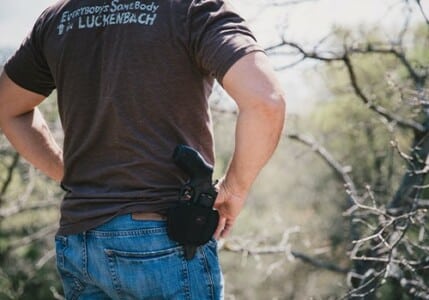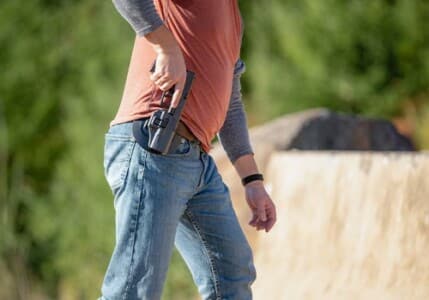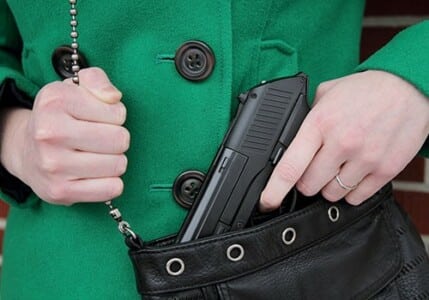
Gun laws vary from state to state. However, all states have laws and regulations governing how you can obtain a firearm, where you can possess one, and when you can carry one with you. All states either permit gun owners to carry their weapons with them or not.
Open carry and concealed carry laws differ across the nation depending on the landscape and customs of the people in the state. In more rural areas, guns are tools for hunting or protecting crops from invaders, so rules may be laxer. In denser populations, firearms are typically more restrictive, though not always. People’s attitudes toward guns also differ from region to region. Thus, Texas has less restrictive gun laws than New York, for example, especially with respect to open or concealed carry permits.
Constitutionally, the people of the United States have the right to bear arms under the Second Amendment. But each state interprets that right balanced against public safety concerns, especially with regard to law enforcement. And the regulation of handguns is typically more stringent than hunting rifles, shotguns, or assault weapons.
To be clear, open carry means you may carry a firearm openly in public, whereas concealed carry means you carry a firearm hidden on your person or in your car. You should know when or if your state allows you to open carry or concealed carry, with or without a permit or license.
Table of Contents
What Is Open Carry?

Open carry refers to carrying a weapon on your person in public. So, if you have a handgun strapped across your chest or on your belt where anyone can see it, you are publicly displaying your weapon. But the firearm does not have to be on display. Almost all states have some law permitting open carry or allowing it with a permit or license.
For example, New Jersey allows a person with a permit to openly carry a handgun. However, permits are not easy to get. Typically, someone must demonstrate a need for protection or self-defense due to their profession, like a security guard, including incidents showing a threat to someone’s well-being or life. And most states have some background check requirements to exclude those ineligible to buy or own guns, like felons or those of unsound mind. However, Texas, Vermont, Utah, and Virginia allow open carrying of handguns and long guns, and Texas allows open carrying without a permit.
But even in Texas, some places are off limits to guns. Schools, federal buildings, prisons, public parks, vehicles, and boats are typically gun-free zones or permitted with exceptions. Texas allows open carry in public places, but guns must be holstered in public or in cars and boats.
While all states have open carry laws, none of them have unrestricted open carry. No matter how lenient, each state has minimum requirements or prohibitions against displaying weapons in a threatening manner. And many states require handgun licenses as a condition for carrying a weapon.
What Is Concealed Carry?

Concealed carry refers to gun owners possessing a weapon hidden on their person or elsewhere, like in a car. Concealed carry laws, like open carry laws, support a gun owner’s need for self-defense. Though all states allow concealed carry, some states do not issue permits to carry a firearm concealed on your person or in your vehicle. Other states make it extremely difficult to obtain a permit for concealed carry. And many states limit people to carrying concealed handguns only. State laws govern how to obtain a gun and where to keep it.
Many states allow you to possess firearms on private property without a license, such as at your home or place of business. But concealed carry means public places. Thus, South Carolina allows concealed carry with a permit, except that those taking their guns hunting or to target practice enjoy permitless carry. They do not need permits to conceal or open carry weapons for specified recreational purposes. Indiana does not require a permit for open or concealed carry as long as you are not disqualified from possessing a firearm by law, for example, if you are a convicted felon.
You are more likely to obtain a permit to carry a concealed weapon in constitutional carry states or permitless carry states. The former allows qualified firearm owners to carry handguns, and the latter refers to states that allow qualified individuals to carry. Some states disqualify individuals convicted of DUIs from carrying.
Open Carry VS. Concealed Carry: Key Considerations & Which Is Better?
Weighing open carry against concealed carry depends on where you live. Obviously, open carry attracts attention, whereas concealed carry does not. Open carry supporters claim that a gun puts criminals on notice that they may face resistance, and thus, it acts as a deterrent. But others maintain that an exposed weapon draws trouble. You could end up a target for criminals willing to shoot you first before getting shot. And you lose the element and advantage of surprise that a concealed carrier has over criminals. Moreover, frightened people seeing a gun may report you to the police.
But if it ever does come down to a shootout, the individual carrying a weapon openly has the response time advantage. It is quicker to pull a gun from a holster than to draw one from a hidden place under clothing or in a pocket. In addition, open carry holsters can adjust how snugly the gun fits to make it difficult for anyone but you to grab your weapon, so it may be safer than carrying a gun in an unsecured place on your body.
Furthermore, a holster is probably more comfortable than squeezing a gun into a waistband concealed carry holster that presses the weapon against the wearer’s skin. Over time, the concealed carrier can get skin irritations and sweaty discomfort. Also, the open carry holster that keeps the gun off your skin can catch on clothing or other materials you encounter throughout the day.
Open Carry VS. Concealed Carry Laws
The most significant consideration in choosing one over the other is where you live. In a constitutional carry state, you can carry a handgun without a permit. Still, other open carry states require carry permits or restrict permits to certain people and methods of carrying.
While all states allow concealed carry, not all states do the same for open carry. However, where both exist, getting a permit for open carry is typically less stringent than for concealed carry. In some states, it is almost impossible to get a concealed carry permit. Thus, in states that require permits for concealed or open carry, you can open carry if you have a concealed carry permit. And some states give reciprocity to concealed carry permits. Alabama, Kentucky, and Oklahoma recognize concealed carry permits from other states.
States differ in constitutional carry laws, shall-issue permit laws, and may-issue permit laws. For example, Oregon, Colorado, Tennessee, Missouri, and Wisconsin, among others, allow open carry without a permit. Connecticut, Rhode Island, and North Dakota, to name a few, are states that allow open carry of firearms with a permit. Most states allow open carry, either by permit or not. California, Florida, New York, the District of Columbia, Illinois, and South Carolina ban open carry and carrying concealed weapons (CCW). And federal laws do not mention open or concealed carry but criminalize carrying firearms in certain areas.
When it comes to CCW, states divide along the lines of unrestricted, shall issue, and may issue. “May issue” means permits are rarely issued. Hawaii, Maryland, New Jersey, and most of California are may-issue states. Arizona, Maine, and Wyoming are a few of the 18 states that allow unrestricted concealed carry. Montana, Pennsylvania, and New Mexico are “shall issue” states, meaning qualified individuals may get permits. Most states disqualify felons, illegal aliens, those charged with crimes, and people with mental illness from buying or owning firearms.
And Texans can open carry handguns, rifles, shotguns, and CCW handguns. Other states, like Minnesota, restrict the carrying of handguns.
Pros & Cons Of Open Carry
If you carry a weapon in public, you will get noticed, for better or worse. Attracting the attention of a person looking to rob a convenience store may be fortunate. Your gun might dissuade a person with bad intentions from committing a crime and risking having a gun pointed at them. On the other hand, a violent criminal may look at your gun in plain view as a challenge or threat that induces them to shoot you. And a police officer may confuse you for a criminal shooter.
If your state requires you to open carry a firearm in a holster, you might have an advantage in a shootout with a criminal, depending on the retention options of your holster. Your gun is available and at your disposal by pulling it out of the holster with quick release or retention. So, for example, most police officers have three levels of retention, with the toughest reserved for preventing anyone from grabbing a gun from the holster. Looser retention allows the gun holder to quickly release their gun from the holster while making it hard for anyone else to pull the gun.
Ultimately, more states allow open carry or open carry with a permit than concealed carry, so it is easier in some cases to get an open carry permit to carry a weapon openly than a concealed carry permit to carry a concealed firearm.
Pros & Cons Of Concealed Carry
Concealed carry has some of the advantages of open carry, such as quick responses to criminal attacks, self-defense tactical advantages, and demonstrating responsible gun ownership. When you are a potential victim of a crime and the perpetrator has a weapon or even fists, you are better equipped to fend off an attack with a concealed weapon.
Since most people carrying a concealed weapon apply for a permit or otherwise follow the rules, they can demonstrate responsible gun ownership, which includes legitimate uses of guns for self-defense. That matters to those skittish about seeing guns. Moreover, law enforcement supports concealed carry as a possible deterrent to crime. In fact, Dr. John Lott, a gun historian, conducted a study showing that the increase of concealed weapons in shall-issue states over the last decade has decreased violent crimes in those states.
Concealed carry, however, may cause a slower reaction time to a shooting response or personal attack. Many weapons are concealed in pockets or waistbands that require the owner to lift a shirt or pull a gun from a confined space, which may slow the response time to react to a gun pulled on a crowd or on a specific individual. In addition, carrying a gun in a waistband or pocket can be uncomfortable and irritating if it touches the wearer’s skin.
The Bottom Line
Gun rights advocates applaud more shall-issue or constitutional carry states that allow for more people wearing guns as supporting the Second Amendment. Those in favor of stricter gun laws to promote safety want to see fewer open and concealed carry permissive laws and more prosecutions for gun law violations. Some states prosecute carrying without a gun license as a felony, while others consider it a misdemeanor.
For those states allowing unrestricted weapons carrying, the people’s safety depends on responsible gun ownership and use. In other parts of the country, gun carrying is highly regulated. Handgun owners must apply for an open carry or concealed carry license. Moreover, some states have enacted new laws requiring applicants to demonstrate gun safety training by certified instructors. In all, no matter where you live, your gun rights are not entirely unrestricted, as open carry or concealed carry can be a double-edged sword in deterring or attracting crime, promoting safety or violence.
Frequently Asked Questions
Which type of gun carrying is more common?
Nearly all of the United States allow some degree of open carry, whether with or without a license or permit, so open carry is more common than concealed carry. However, more state legislatures are adding new laws to enable concealed carry. Arkansas, Iowa, Montana, Tennessee, Texas, and Utah are the latest states to jump on the bandwagon of loosening restrictions on concealed carry.
However, unless it is obvious, concealed weapons are not always easy to detect. Barring constant gun adjustments or bulges under a jacket or shirt, most may not know whether someone is carrying a firearm. And in states that require permits, statistical data may reveal how common it is to carry a hidden weapon.
What are the benefits of open carry vs. concealed carry?
Aside from the superior comfort of fostering a gun outside your clothing instead of inside, openly carrying a gun may make you feel safer. Since your gun is on display, you are a walking warning sign to others with bad intentions. On the downside, your attitude toward showing off your gun can draw uncomfortable stares and fearful reactions from those around you in public places. Some patrons may feel troubled by an individual sporting a big pistol in their waistband and keeping their hand on or close to it.
No such problem exists with a concealed weapon. Most do not know you have a gun on you, so you probably avoid the stares and fright, but you also do not scare the people you want to scare. Those who would commit a crime at a public venue or against your person most likely won’t know you have a gun. That is good for the element of surprise in defending yourself, but it also may be difficult to access your gun in a tight situation. The time it takes to access your weapon could mean the difference between life and death in a defensive situation.
Does concealed carry have any advantages over open carry?
The advantage of having a hidden gun on your person is self-defense confidence without the accusing stares or doubts about your intentions. Face it. The legitimate reason for an ordinary citizen to carry a gun in public is for self-defense and safety.
Knowing you have a weapon in case of a shooter incident or a violent attack may make you feel less fearful. You might even feel empowered to protect others in the event of a terrorist shooting incident in public. The perpetrators may not single you out for displaying a gun as someone open carrying would.
And at least one study shows that more weapons carriers lead to fewer violent crimes. A person intent on shooting people in a public place may think twice if they know enough people are armed to thwart their plans before mass murder occurs. And law enforcement seems to favor concealed carry for its deterrent effect.
